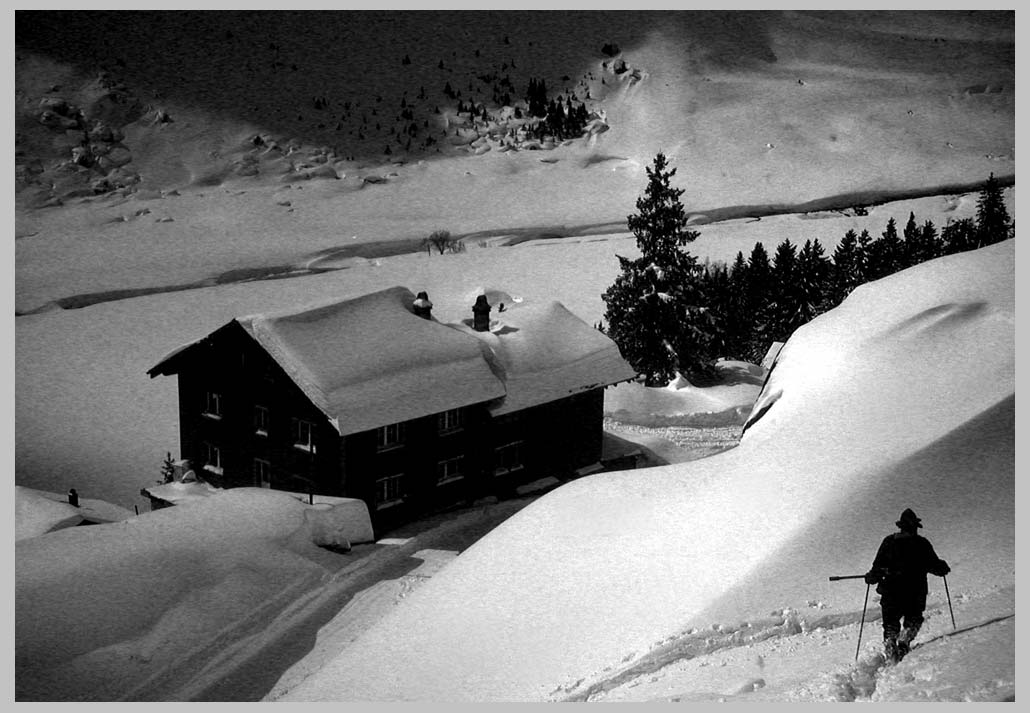

Breaking Trail / April Snow (mountain farming village at 1600 m.)
On the road in the European Alps. [ click photo for next . . . ]


Breaking Trail / April Snow (mountain farming village at 1600 m.)
On the road in the European Alps. [ click photo for next . . . ]
Follow @cliffcrego
WANDERER, featured below, and part of the FIREWEED POEMS,
is the first piece in a cycle of poems called ON THE WAYSIDE.
Very different in theme and sound than other of my texts presented
in PHOTOWEEK, the Wayside poems all share a rather formal,
musical use of language.
Instead of thinking in terms of meter or beats and the like, with
the Wayside poems, the details of rhythm and form emerge out of
different qualities of large-scale movement.
This is much like the ripples, splashes and whirlpools on the surface
of flowing water emerge out of the deeper, formative movements of
a stream itself.
Briefly, the two most important features of movement which concern
me here are:
(1) What I think of as waves of fluctuating density, like
the fluctuating density of raindrops on a tent, which change
in recurrent patterns from low to high and back again:
* * * * * ** ***** *** ** * * *
growing denser... ...growing less dense
(2) The movement to and away from centers of attraction:
> > > > >> >>>>>0<<<< << < < < <
moving towards... center ...moving away from
The centers of poems are moments or places where meanings
converge and manifest in a musical way.
In a longer composition, this is what holds the poem together,
with all the other sounds turning around the center, much like
water turns around the middle of a vortex.
A poem's center is frequently also the part of the poem we
remember first, that 'sticks to us', as it were, much like seeds,
while walking along, sometimes attach themselves to the fabric
of our clothing.
While listening to WANDERER, you might notice that the main
such center comes,
as I hear it, with:
"...the
travail of
these necessary crossings
of arbitrary borders..."
It is perhaps a phrase one can ponder. And the rhythm, of course,
goes mysteriously fold into fold:
"...__
__ __ __
__ __ __ __ __ __ ___
__ __ __ __ __ __ ___..."
At the level of the individual sounds or words, there's a kind of
geometric play of one, two, three, five or eight steps (or syllables)
to a phrase or line:
__
__ __
__ __ __
__ __ __ __ __
__ __ __ __ __ __ __ __.
And, similarly, there are one, two, three, five or eight lines
to a cluster, grouping or stanza. This is what creates the visual
irregularity of the line breaks in all the poems of this cycle.
(Mathematicians may see a certain fractal-like quality in the
patterns, with self-similar movements nested within one another.)
All of this is, of course, is only important from the compositional
point of view.
What is of primary significance is the actual movement of meaning
in the piece as it is spoken or heard. At the same time, for those
interested in the meaning of the movement, both as perceived and
as conceptualized, this is the way of looking which underlies
the work.
WANDERER
Moving,
always moving, and
living inside movement. Not the
artful, cyclic, back
and forth
of the migratory birds, but
more the
discrete
stammer
of a tongue finding its way down
the tangled
streets of peregrine
words;
Not
the fountain's smooth, continuous,
laminar flow, nor
the fractal exuberance of
white water,
but a broken movement of stops and starts,
our passageway to the wayside,
to the
travail of
these necessary crossings
of arbitrary borders...
Light. Easy.
Taking refuge among the trees.
The rhythm, of cautious walking,
a weaving
together
of the unfamiliar and half-
forgotten,
picking up songs as we go like
so many seeds
moving from home to
home on
the fur of our pants.
from ON THE WAYSIDE . . .| download mp3 WANDERER AT SUMMIT CREEK |
The avian soloist featured above is the a song sparrow;
it was the only one singing this cold first week of April
at 1500 m.
All Photographs & texts by Cliff Crego © 1999 -2014 picture-poems.com
(created: IV.13.2011)